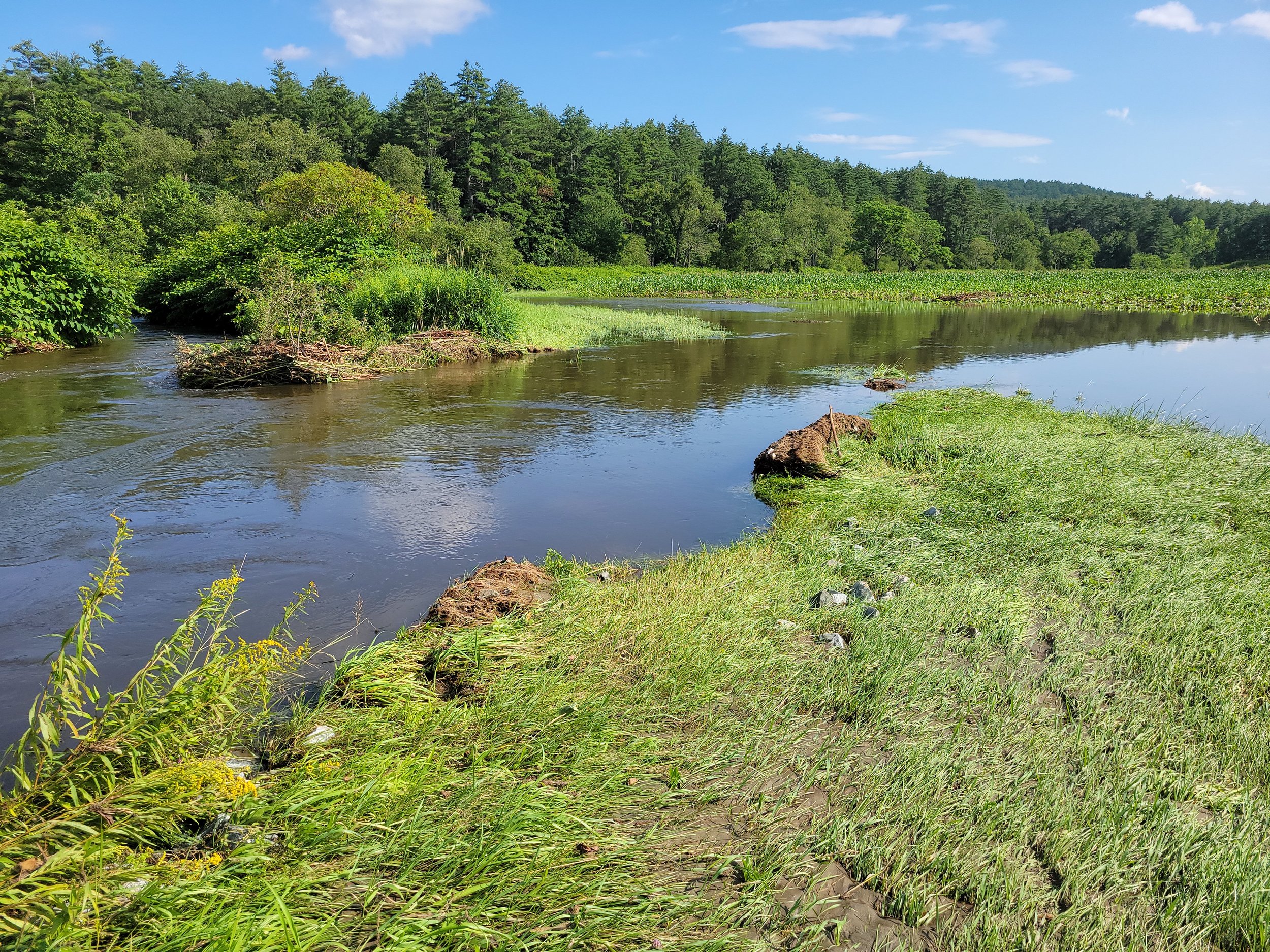We are sitting in the middle of a summer so very different from last year where everything languished in a never ending seasonal drought that effected crop productivity and wore everybody down. It was tough to deal with dust and heat and try to farm in a climate that then was more suited to dryland grain farming and felt like eastern Colorado. Fast forward to this year and the lushness and soggy conditions have fostered epic weed growth, leached nutrition from the cultivated soils and brought every vegetable disease in the book up on these wet southern storms. I may be singing a different tune by the weeks (note: I am now singing a bit of a different tune. On Friday July 21 we got an additional 3” of rain in our town. Local Blow Me Down Brook blew out of its channel wiping our two acres of corn and eroding gullys in the field in an effort to create a new, more efficient channel. Elsewhwere at Ray and Jenny we lost 30 to 40% of a three acre planting of fall crops that were just transplanted earlier in the week to pounding rain and rushing water. The resulting addition of water front property was unwarranted and unwanted. On the home farm we additionally had invest in two truckloads of aggregate to put our farm roads and driveways in order.)
A new brook bed in the making where a field of sweet corn used to be
It actually is much worse for some of my farmer friends and colleagues. The recent flooding has left us at Edgewater relatively unscathed compared to those whom lost total crops, top soil and is some cases whole farms, buildings and machinery. We see dramatic pictures of the dam in Quechee with the river at full tilt flood stage, yet we don’t see the photos of the dairy farms in Colchester with standing water slowly rotting the corn in their fields. You are not hearing the full stories of the many orchards whom are trying to balance their farm workforce and annual cultural responsibilities with no future income to offset their daily expenses. Small start up farmers are struggling to determine whether to marshal on with loss and increasing debt when they have not been in operation long enough to have developed any measurable equity in their enterprises. Should they just throw in the towel, and start paying back the operational loans by getting a job driving trucks for UPS or go further into debt to continue their dream? These are stories of a slower, less dramatic war of attrition that is being fought by many new England farmers.
It has been a difficult year for all farmers, regardless of their commodity. Early freezes, extreme moisture and heat have made it a very different kind of season than the 2022 season. But climate change has proven that we will have to learn to adapt to these extremes, and the general public will begin to learn how fragile their food system is with the continuance of these climate extremes. The cost of food at the store will reflect the cost and difficulty of producing that food. The general public would be wise to begin to re engage in participating in producing their own food through gardening, canning and preserving as well as learning what it is to eat sustainably.
Despite the weather there have been some surprisingly high points in the 2023 growing season thus far for Edgewater. Despite the early freezes and lousy picking weather, the strawberries did reasonably well with good size and pretty good flavor. The blueberry crop has sized up well (no doubt from abundant rain) , and we have a solid line of vegetables on the stand now (not guaranteeing the future) with good succession planting lined up. We have lost culinary herbs, several acres of sweet corn and some cucurbits to date, along with topsoil and time……again nothing compared to the devastation many have experienced. The challenge going forward-especially if the weather continues in the wet pattern- will be disease pressure on the vegetables. Many of the later season pests-both insect and disease- have already arrived and settled in. And we are very concerned that the May freezes that damaged the nut trees in area forests will have the bear, birds and deer coming out of the woodwork to feast in our fields for lack of food in the woods. Currently deer are feeding on peppers, tomato plants, and nibbling on potato vines and it’s very early to see this level of animal intrusion. Large flocks of geese whom are struggling to stay in the surging river have taken tenancy in our lower meadow and are raising havoc with the carrots. There is yet a long growing season ahead of us… lots can go wrong or go well…..we shall see.
We have a pretty good crew on board. We have a delightful farmstand crew out front and in the kitchen, with a lot of experience, again overseen by our pal Alli Boeri from Hartland. The returning guys from Jamaica have a lot of historical experience on the farm so that relatively little oversight is needed for the tasks at hand once the days goals are outlined. It is a much an older crew in the field. A couple of youngsters in their forties and a young woman in forestry school, but 8 of us are over 60. The senior member of the field crew just had his 92 birthday. That is not a typo. George Cilley drives up from Bradford NH four days a week and works about a 7-8 hour day. He is point man on spring tillage, doing a lot of the field prep; plowing, harrowing, field cultivation and during the season he does a lot of mowing around the fields and buildings. He also supervises and does any number of different carpentry projects that crop up on the farm. I first met George as a five year old when he came to work at my family’s dairy farm. We have a mutual agreement not to reveal any sordid details about each other’s past. If he has one character flaw, I would say that he is opiniated about his choice of ice cream and wont keep anything but chocolate or vanilla in his freezer.
Steve Maguire and George Cilley hard at building reparations
So once again the main story on the farm has been one of weather and climate change and how we are doing whatever we can do to cope with, deal with and and farm within it. Though last year was a perfect year to make hay and go to the beach, it actually was harder for us to function with the extended drought and we lost a great deal of crop income because of it. In our particular little corner of the world this wet weather has -in a very few ways- been an easier year to cope with. That said, the flooding and weather patterns have us walking on broken glass in a what seems like a war of attrition with Mother Nature, knowing that a couple of gully washers in the White River Valley could really inflict some hurt on our farm.
Skid steer view of July 10th flooding in lower meadow strawberry bed



